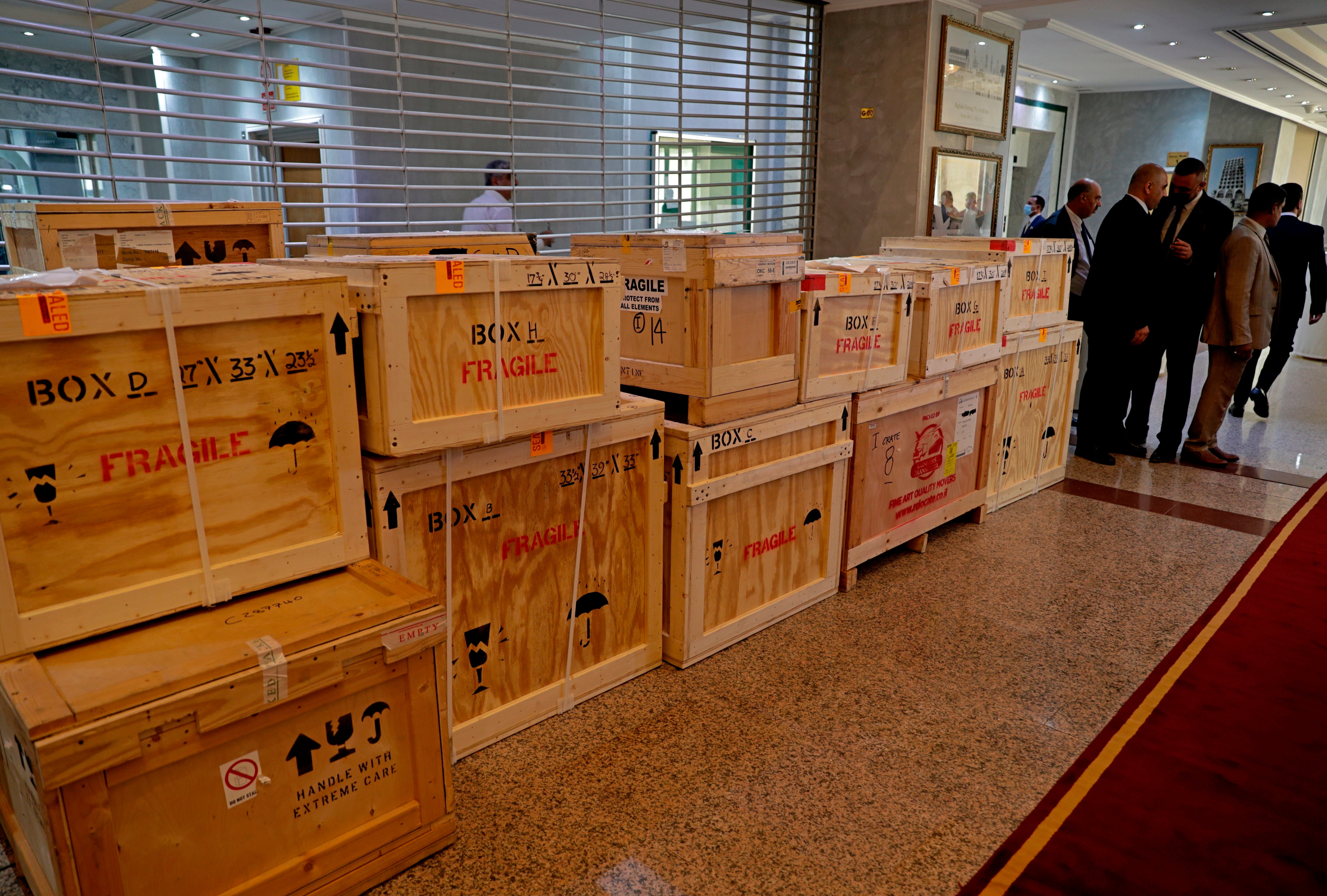US returns thousands of looted ancient artifacts to Iraq
Iraqi Culture Minister Hasan Nadhim called the restitution ‘the largest in the history of Iraq’

Smugglers have looted Iraq of thousands of ancient artifacts, many dating back 4,000 years, in the two decades since the US invasion and fall of Saddam Hussein.
Many of Iraq’s stolen antiquities have ended up in museums and personal collections in the United States – a dynamic depriving Iraqis the fruits of their own history.
On Tuesday, some of that historical record was set straight when Iraq said that the United States handed back more than 17,000 smuggled artifacts confiscated by U.S. authorities.
Iraqi Culture Minister Hasan Nadhim called the restitution “the largest in the history of Iraq,” according to the Associated Press. He said the Iraqi government and its embassy in Washington had been working for months on the arrangement.
While the majority of the artifacts were recovered from the United States, other items in the cache came from Japan, the Netherlands and Italy. The Iraqi government said it planned to put the most significant artifacts on display in the country’s National Museum.
Mr Nadhim on Tuesday praised international efforts to apprehend smugglers and return the looted possessions.
“The United Nations resolutions are supporting us in the international community and the laws of other countries in which these artifacts are smuggled to are on our side,” he said, adding, “The smugglers are being trapped day after day by these laws and forced to hand over these artifacts.”
But he said efforts had to be continuous.
“There’s still a lot of work ahead in this matter,” he said, the AP reported. “There are still thousands of Iraqi artifacts smuggled outside the country.”
Late last month, US federal authorities took ownership of a rare cuneiform tablet, known as the Gilgamesh Dream Tablet, from craft company Hobby Lobby, which had purchased the item for nearly $1.7 million to showcase at the Washington, DC-based Museum of the Bible.
Authorities said the tablet and the epic poem inscribed on it – thought to be one of the world’s oldest literary and religious texts – had been illegally brought into the United States, after which Hobby Lobby privately purchased it through an international auction house.
“Thwarting trade in smuggled goods by seizing and forfeiting an ancient artifact shows the department’s dedication to using all available tools, including forfeiture, to ensure justice,” Assistant Attorney General Kenneth Polite of the Justice Department’s Criminal Division said in a statement.
Communities across the Middle East have long decried the loss of their antiquities to Western collections and museums; in some cases, items were stolen violently by colonial rulers.
Some collectors and preservationists have argued that not all countries are equipped to protect the artifacts. But critics of this claim say that international efforts should go toward supporting local capacity so that each country can be in control of its own cultural heritage.
In Iraq, the chaos that followed the 2003 U.S.-led invasion and toppling of Hussein provided a prefect storm for plundering artifacts. In one notorious incident, days after U.S. troops took over, Iraqis looted Baghdad’s National Museum of an estimated 15,000 items, just over a fourth of which had been returned as of March.
In the years since, corruption and the neglect of archaeological sites due to a lack of funds have enabled further looting. The Islamic State, which between 2014 and 2017 controlled a third of the country, notoriously destroyed some antiquities while smuggling and selling others.
In 2015, the United States handed over more than 400 ancient artifacts to Iraq that U.S. Special Operations forces had seized during a raid on the house of an Islamic State leader.
Three years later, in 2018, US authorities returned to Iraq nearly 4,000 smuggled antiquities that had been confiscated from the Green family, the evangelical owners of Hobby Lobby and a driving force behind the Museum of the Bible. In a settlement, Hobby Lobby agreed to pay a $3 million fine for the illegal importation.
In Europe, pressure has been growing on some countries to return collections plundered from formerly colonized communities across Africa.
In May, Germany became the first country to pledge to return to Nigeria hundreds of ancient artifacts belonging to the Benin Kingdom, which ruled southern Nigeria until Britain invaded in 1897. Germany’s minister of culture called the restitution plan “a moral imperative”.
The Washington Post
Join our commenting forum
Join thought-provoking conversations, follow other Independent readers and see their replies
Comments